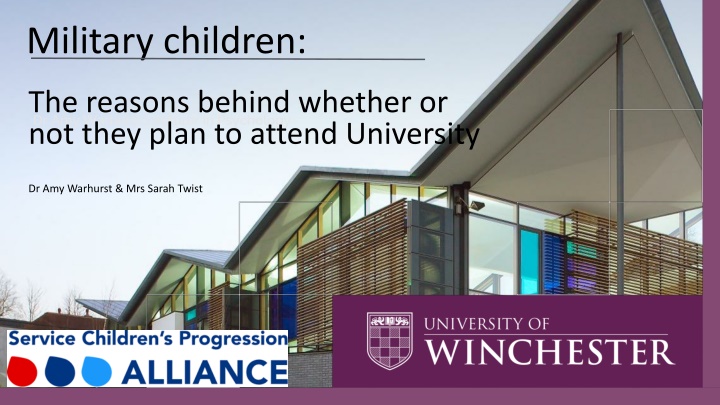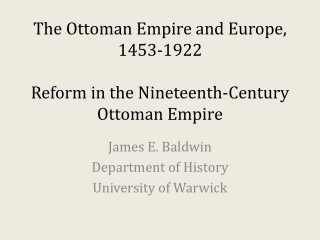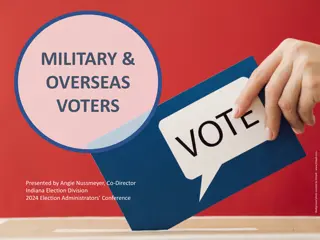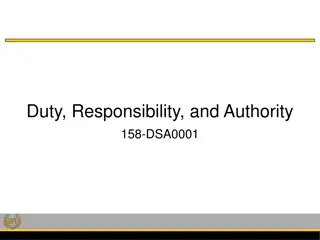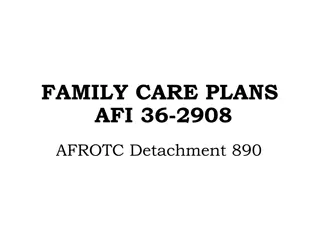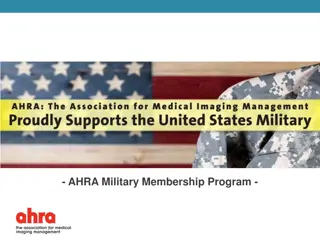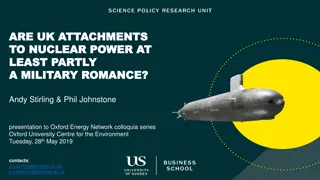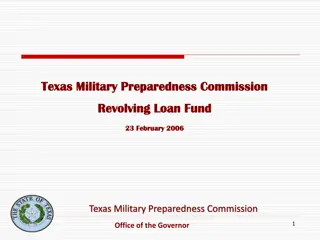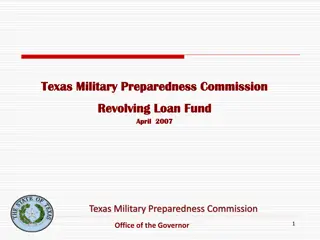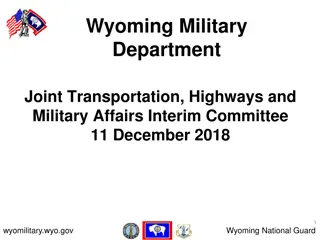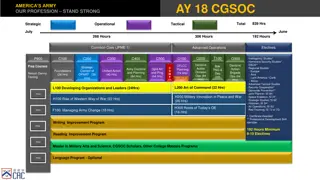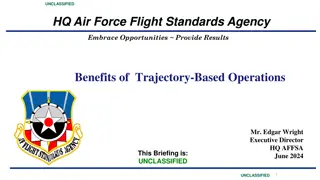Military children
This research study delves into the factors influencing military and non-military children's decisions on attending university. The study explores the unique challenges and aspirations of military families and how they impact educational choices.
Download Presentation

Please find below an Image/Link to download the presentation.
The content on the website is provided AS IS for your information and personal use only. It may not be sold, licensed, or shared on other websites without obtaining consent from the author.If you encounter any issues during the download, it is possible that the publisher has removed the file from their server.
You are allowed to download the files provided on this website for personal or commercial use, subject to the condition that they are used lawfully. All files are the property of their respective owners.
The content on the website is provided AS IS for your information and personal use only. It may not be sold, licensed, or shared on other websites without obtaining consent from the author.
E N D
Presentation Transcript
Military children: Dr Amy Warhurst Lecturer in Psychology The reasons behind whether or not they plan to attend University Dr Amy Warhurst & Mrs Sarah Twist
Overview Background: Literature Review What we know so far Method: What we did and why Results: What we found Conclusions: What this might mean Group Discussion: Lots to think about for future research Summary: Main points to take from this session
Background: Military families experience a unique environment of stressors and protective factors (Chandra et al, 2010; Engel, Gallagher & Lyle, 2010) Some education institutions are more military friendly than others (Wilson et al, 2016) No two military families are the same (Clever & Segal, 2013)
Method: Focus Group interviews with Y10 children from military and non-military backgrounds Designed to understand reasons behind decisions to remain in education (including University plans) or to pursue other avenues. Widening participation was the driver behind this pilot research: What are the barriers/enablers for military children attending University?
Method: Details Participants: Grp 1 Military (n=9) Grp 2 Non-Military (n=10) Materials: Semi-Structured Interview questions/prompt sheet Procedure: Teacher present in the room for both groups. Group warm-up conversation. Initial questions about future career thoughts and GCSE options later asking about different influences on these choices.
Results: Thematic Analysis I wanna be in the military but I don t want to be in the military because it looks hard. I don t wanna go to war, but then I do. It s just like 50/50, do I want to, do I not want to? And then I have like, electronics that I like doing so I don t know if I ll go down that road or that road, it s confusing. I might go down the middle, just something different
Results: Future Careers All students (bar one in the non-military group) expressed a desire to go to university Overall, students from both cohorts were unsure what career they wanted - Several students expressed an interest in a particular industry e.g. finance, IT. Students in both groups stated that they would be happy to live or work in another country with their jobs Students in both groups spoke about a desire to make money
Results: Family influence Non-Military My dad just wants me to be rich I actually want to do hair and beauty but my mum won t let me it s not enough pay My mum works overnight as a nurse, but I don t want to do that she s always so moody I m definitely not following my dad. He s an estate agent he works for like, 11 hours a day My dad told me to never go into social working
Results: Family influence Military I wanna be in the military but I don t want to be in the military because it looks hard if you re military then you re used to moving around anyway, like your parents do like move around a lot
Results: Family influence A majority of students spoke about being influenced by their parents careers The non-military group spoke a lot about not wanting to do what their parents did The military group agreed that it looked like a hard job and therefore they were less likely to choose a military career themselves Some students also expressed a desire to do what their parents or older siblings did for work e.g. electrical engineer, mountain bike coach
Summary of Findings: Being a military child, or not, seems to have no influence on students desires to attend University Family careers were more likely to show young people what they did not wish to do None of the young people could name any particular barriers/enablers to attending University
Considerations: This is a very small pilot study, carried out in one school, with a teacher present during the interviews More pupils from other schools would enable a deeper understanding of pupils thoughts in this area. The young people were all in Y10 - perhaps too early to have given serious consideration to University and all that entails That these young people s parent(s) are in the military now suggests a long-term military career what about those whose parent(s) stay for less time (e.g. 5 years)?
Next Steps: Speak with more pupils, perhaps Y13, from a variety of schools/colleges, asking similar questions Include a group of young people who used to be military children 5+ years ago, and ask similar questions Consider longitudinal research tracking military and non-military children through school looking at a range of aspects (attainment/attendance/ resilience/ school enjoyment etc.)
Group Discussion: Lots to think about for future research What have we missed? What can we improve? What are children from military families doing instead of HE? What else do we need to know about military children and University attendance decisions? What data do we need from MOD? Schools? UCAS? Universities? Anyone else?
References: Chandra, A., Lara-Cinisomo, S., Jaycox, L. H., Tanielian, T., Burns, R. M., Ruder, T., & Han, B. (2010). Children on the homefront: The experience of children from military families. Pediatrics, 125(1), 16-25. Clever, M., & Segal, D. R. (2013). The demographics of military children and families. The Future of Children, 13-39. Engel, R. C., Gallagher, L. B., & Lyle, D. S. (2010). Military deployments and children's academic achievement: Evidence from Department of Defence Education Activity Schools. Economics of Education Review, 29(1), 73-82. Wilson, C., Sour, A. J., Miller, L. A., Saygbay-Hallie, M., Miller, C., & Daniels, R. A. (2016). A standardized tool for measuring military friendliness of colleges and universities. SAGE Open, 6(2), 2158244016644009.
